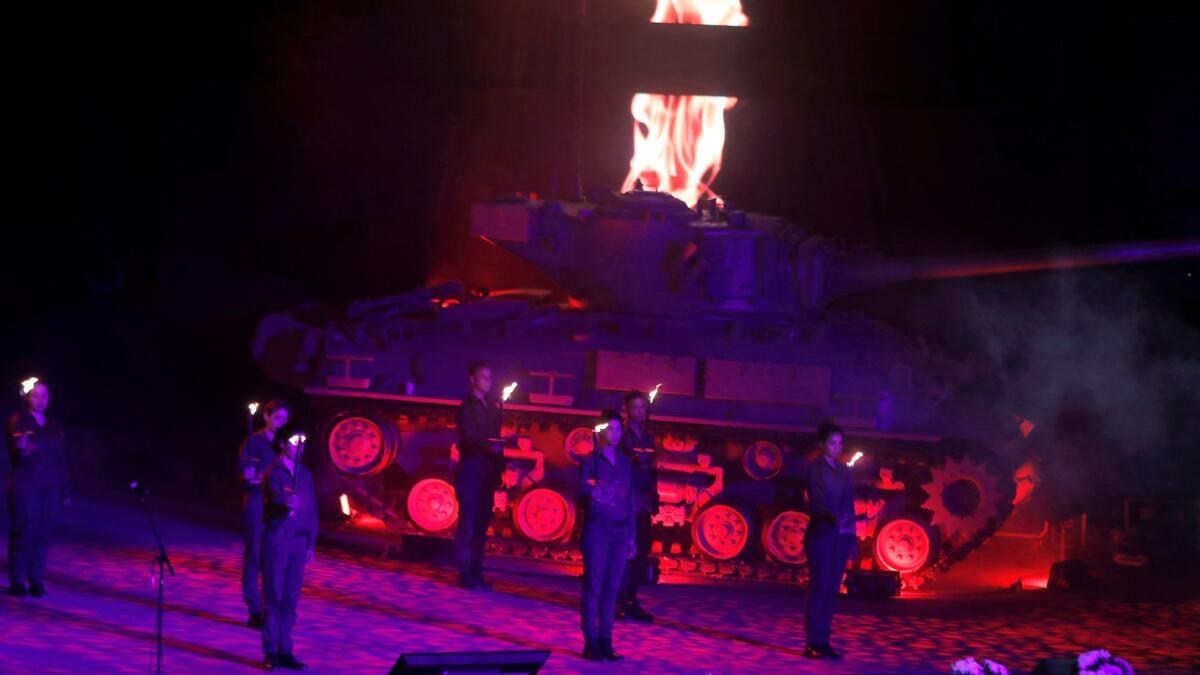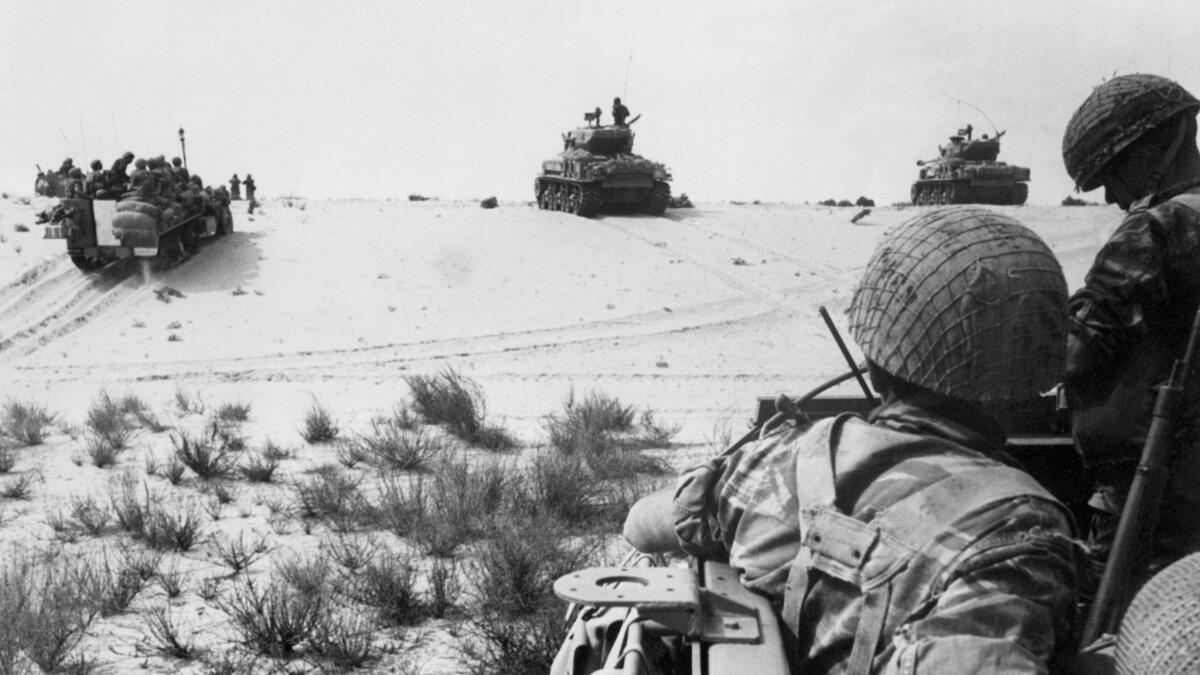Half a century after the euphoria of the Six-Day War, some Israelis are wondering if it was a victory

Reporting from TEL AVIV — Hundreds of guests and dignitaries gathered at the Knesset, the Israeli parliament, for a special session Tuesday marking the 1967 Six-Day War. It was a celebration of Israel’s lightning military victory over Arab armies in the Sinai Peninsula, Golan Heights, West Bank and East Jerusalem that forever changed the landscape of the Middle East.
In an address that waxed nostalgic for the euphoria that swept Israel in the war’s aftermath, Prime Minister Benjamin Netanyahu invoked the biblical history of the Jewish people in Hebron and Nablus, the West Bank cities that were captured during the conflict. “The Six-Day War returned us to the country from where we had been cut off for generations,” he said. “This is our land.’’
Absent from the parliamentary party, however, were legislators from Israel’s pro-peace Meretz party. Not enough attention, they said, was being paid to the consequences of Israel’s unending control over millions of Palestinians who live in the lands occupied 50 years ago this week.
Tamar Zandberg, one of the party’s parliament members, complained that the celebrations ignored the fact that the West Bank has lived under military rule for 50 years.
“This casts the biggest shadow over Israel’s democracy in its history — and for its continued existence,” she said on the parliament television channel. “This reality is really abnormal — it’s distorted, and we need as quickly as possible to reach a solution to this in the form of an agreement.”
The dissonance between the prime minister and the opposition politician highlights the extent to which the anniversary of the war is stirring a debate in Israel over whether one of the country’s most storied military victories planted the seeds of a modern political disaster.
Israel scored a total defeat against Egyptian, Jordanian and Syrian forces, perhaps one of the last moments in the Middle East that a military conflict has been decided so decisively. The victory transformed Israel from a small, vulnerable outpost teetering on the eastern shelf of the Mediterranean into a regional power player with ample territorial buffers against any potential new attacks.
It’s a moment of clarification that is forcing Israelis to be more honest about where we are heading.
— Ehud Eiran, professor of political science, Haifa University
After surviving a traumatic surprise attack in 1973 by Egypt and Syria in an attempt to recover their territories, Israel eventually traded Sinai for a peace accord with Cairo in 1979 and established full diplomatic ties with Jordan in 1994.
But the 1967 war also began Israel’s self-declared military occupation of the West Bank and the Gaza Strip, along with its controversial annexation of East Jerusalem, which formerly belonged to Jordan.
Described as temporary, the occupation gave Israel control over the lives of a Palestinian population that today numbers 4.9 million.
It also opened the door to establishing hundreds of Jewish settlements and outposts in those territories — neighborhoods that many right-wing Israelis, including Netanyahu, now consider an inseparable part of the country.
At official ceremonies and academic symposiums and on the opinion pages of newspapers, the anniversary has become an occasion among Israelis for taking stock of what was gained, and the continuing costs of the country’s failure to turn those 50-year-old military gains into lasting security.
“It’s a moment of clarification that is forcing Israelis to be more honest about where we are heading,” said Ehud Eiran, a professor of political science at Haifa University. “There’s a growing belief that this reflects a permanent reality, rather than the stories we told ourselves that it’s a temporary occupation.”

In a late May survey by the Israel Democracy Institute released this week, about 62% of Jewish Israelis disagreed with the idea that control over the West Bank constituted a military occupation.
Although a two-thirds majority considered control of the West Bank to be a boost for Israel’s security, the survey also found that the public was evenly split over calls by right-wing politicians to annex the territory.
For the religious nationalist leaders who lead the settlement movement, the jubilee anniversary is being hailed as a sign of the settlements’ permanence. Tens of thousands of religious nationalist supporters gathered at the Western Wall plaza on the Hebrew calendar anniversary of the capture of East Jerusalem in late May to celebrate.
“When I am asked about what is the full vision, what is the future of Judea and Samaria in our eyes, I answer that I want to see, with the help of God, one million Israelis living in Judea and Samaria,” Avi Roeh, who heads the Yesha settlers council, wrote on Facebook, referring to the biblical names for the West Bank.
“It used to seem like a far off, impossible dream…. But today, it’s possible to believe that we’re on the right track.”
In an effort to push back against public perception that the Jewish settlements in the West Bank are an asset to security, the Molad center, a left-wing research institute, released a paper based on interviews with former Israel Defense Forces generals arguing that large amounts of resources are being diverted to the protection of settlements.
Israel’s left wing, which has seen its influence and power diminish over the last two decades, has also been focusing this week on the moral implications of continued control over Palestinians in the West Bank and what it means for the country’s democratic values.
“The settlers have succeeded in creating, on the ground, exactly what they wanted. A reality in which it will be very difficult to draw a border line, which will prevent a separation between us and the Palestinians,” David Grossman, a prominent Israeli author, told the daily newspaper Yediot Aharonot.
“This forces us into making a choice between a few tragic options for those who want a democratic state and a Jewish home. In this sense, the settlers create a danger for the future of the state of Israel, they are dragging us into an abyss.”
Writing in the same newspaper, the son of former Israeli Prime Minister Ariel Sharon dismissed such concerns.
“Those who say that we should have evacuated the territories at once need to be reminded what it was like here before the Six-Day War: a country whose border was near the outskirts of greater Tel Aviv, and which was only 15-kilometers wide,” wrote Gilad Sharon. “Does anyone want to go back to that? With all the problems, our situation today is a thousand times better.”
Gerald Steinberg, a political science professor at Bar Ilan University, argued that Israelis on both sides of the political spectrum do agree that the government needs to come up with a definitive policy to end the state of political limbo started in June 1967.
“Whether you’re on the right or left, the continuing uncertainty for 10 or 20 more years is untenable,” he said. The longer the temporary aspect of the situation lasts, the more unhealthy it is for Israel.”
Mitnick is a special correspondent.
ALSO
Battle begins for Islamic State’s last stronghold in Raqqah
‘Do you think we will go away?’ Islamic State says after attacks in Iran that leave 12 dead
Pentagon says deadly airstrike in Syria was legal and on-target, but may have killed one civilian
More to Read
Sign up for Essential California
The most important California stories and recommendations in your inbox every morning.
You may occasionally receive promotional content from the Los Angeles Times.










